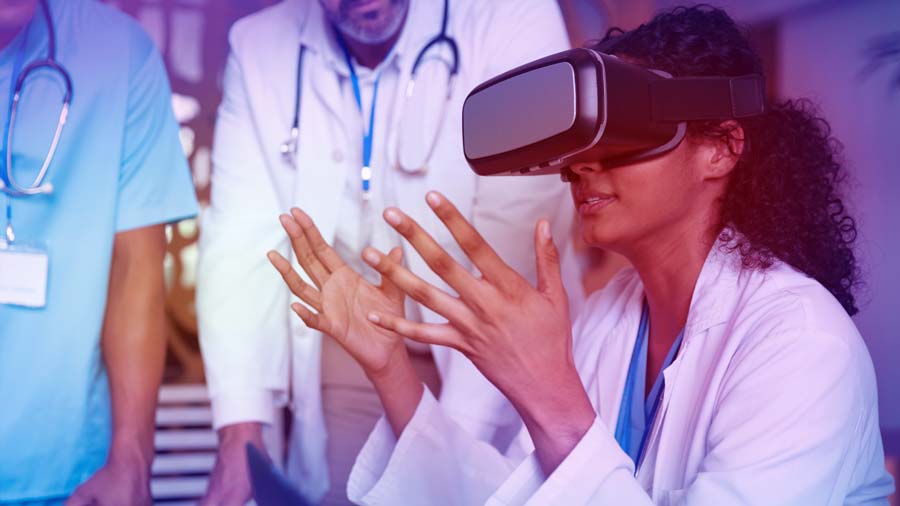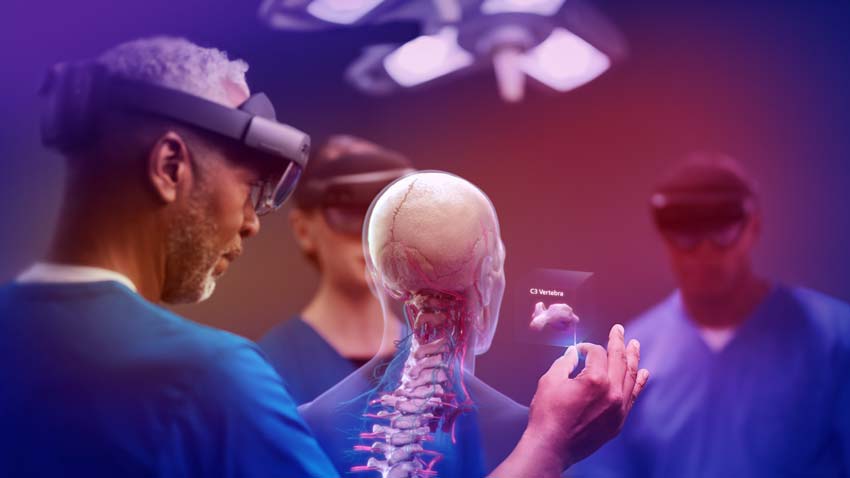Virtual Reality and medicine: applications in the healthcare sector
Immersive technologies such as Virtual Reality or Virtual Reality Augmented Reality have marked a before and after in video games, marketing, advertising and even tourism. And in medicine? The use of Virtual Reality in the healthcare worldis advancing by leaps and bounds, because, despite what you might think at first, the applications of these immersive technologies go far beyond the world of entertainment.
In this article we will review the main applications of Virtual Reality in the medical and health fieldand their benefits and the future of these technological innovations in the healthcare sector.
What is Virtual Reality?
Before delving into the applications and uses of how Virtual Reality is being incorporated into the healthcare sector, it is first important to review what exactly Virtual Reality consists of. Virtual Reality technology.
This is defined as the technology capable of immersing us in completely digital alternative worlds. 3D environments where our senses stop perceiving the real world and focus their attention only on the new virtual experience.
You may be interested in our post about what is the future of Virtual Reality?
This new "reality" in the health care field has opened up new opportunities for new opportunities in diagnosis, treatment and medical training.

Virtual Reality applications in medicine
The use of Virtual Reality in medicine is advancing at an increasingly rapid pace. Many therapies and training courses are already incorporating this technology. immersive technology in their healthcare experiences.
Entertainment and gamification are combined with the precision, training, expertise and specific treatments required for improve patient recovery.
These are some of the Virtual Reality applications that are already being implemented:
Training for physicians
Virtual Reality is a valuable tool for learning, perfecting and acquiring new skills.especially in the healthcare field.
This technology allows simulate realistic situations in which to practice and improve doctors' skills without putting patients' health at risk. An experience in which there is no need to allocate extra resources such as medicines, surgical or sanitary materials, since all this initial trial and error training is carried out in virtual 100% environments.
Formations such as the one developed by Boehringer Ingelheimin which, within a virtual labIn this way, healthcare workers can immerse themselves in the process of preparing their latest intravenous medication, thus practicing its correct use without wasting training material.
Treatment of phobias
The gradual exposure method is one of the most widely used therapies to overcome phobias, however, it is also one of the methods that generates the most rejection due to the intensity that it means for patients to be exposed live to their phobias.
In this case, the Virtual Reality appears as an intermediate stepThe situations are experienced in a very similar way to reality, but in controlled environments. In addition, this technology makes it possible to generate scenarios that would otherwise be complex, costly or impossible to generate within the traditional healthcare environment.
Rehabilitation processes
Another area of work with patients in which Virtual Reality plays a key role is in the rehabilitation processeswhere the gamification turns the repetitive movements of each treatment into real games in which points and rankings provide extra motivation for all patients, regardless of age.
In this type of activity, it is important to keep in mind that the benefits of gamification are only effective if they are accompanied by the teaching habits, routines, resources and helpful behaviors for patients.
Simulations and surgery operations with Virtual Reality
In a sector where training and real experience are two key factors for the good performance of the job, Virtual Reality offers the healthcare world a unique space to be able to realize simulations of operations and other critical situations in safe and controlled environments.
In addition, recreations are used that do not affect the real world and in which it is not necessary to use real patients. This is a unique opportunity not only to train future healthcare professionals, but also to planning and perfecting surgical processes, testing different courses of action.
Awareness projects
An application of Virtual Reality in medicine that perhaps not many people take into account is its use in awareness-raising projects.
This immersive technology allows us to change "reality" by putting ourselves in other people's shoes who may suffer from a disease or disability. Through simulations and interactive games it is possible to bring our awareness messages closer to the general public. It has been proven that Virtual Reality generates higher levels of engagement and emotional connection.
Benefits of Virtual Reality in medicine
Virtual Reality offers multiple advantages in health and medicine, both for patients and healthcare professionals. We will now analyze the main benefits of the incorporation of immersive Virtual Reality (VR) technology in medicine:
Cost and risk reduction
If there is one thing that all the applications described in the previous section have in common, it is that Virtual Reality turns out to be a non-invasive method that benefits both the healthcare professional and the patients.
In addition to being non-invasive, the Virtual Reality is also a cost-effective mediumAfter the initial outlay, the experience can be repeated as many times as necessary without affecting quality, and can be upgraded and customized whenever necessary.
Improvement in medical education
To have better prepared health professionals is a benefit not only for medicine but also for society in general.
Training in exceptional situations, participating in the largest number of virtual simulations of clinical cases, practicing with guided surgeries... a series of activities that help students and healthcare professionals to to put their knowledge into practiceexperience and above all to have the necessary confidence and security to face the real world.
Boosting health research
Virtual Reality makes it possible to create virtual spaces from scratch in which to conduct tests, experimenting with new techniques, protocols and treatments without posing a risk in the real world. A trial-and-error environment that allows researchers to take their projects into virtual "practice", becoming a necessary intermediate step from theory to the real world.
Improved patient experience
Virtual Reality offers a new form of entertainment The new technology is a great advantage in healthcare centers, as it can transport patients to other virtual worlds, places that can even be personalized according to the age and treatment of the patients, all to make their hospital stay and the hours of treatment more bearable.
In addition, through simulations and virtual twins, patients and family members can adapting and training in different situations they will face when they leave the hospital.
Future of Virtual Reality in the healthcare sector
Technology and medicine have never been more interrelated. Although the mass adoption of Virtual Reality in medicine faces challenges such as costs or adaptation, this immersive technology continues to advance, posing a revolution in medical care and a total change in the way we approach health.
In the future, it is expected that the virtualization of the health sector go one step further. As real-time connectivity, the quality of 3D lenses and graphics, and the user experience improve, so will the number of consultations and even virtual surgeries.
Wouldn't it be wonderful if the best surgeon could operate anywhere in the world from his office? In any case, the future of Virtual Reality in the healthcare sector The main objective is the personalization and development of increasingly realistic virtual environments, where you can be trained and carry out the treatments looking for the best results.

Virtual Reality Projects with Imascono
The Virtual Reality projects will play an increasingly important role in medicine and the healthcare sector, revolutionizing the way in which healthcare professionals train, research and carry out their treatments. At Imascono we know that Virtual Reality experiences in healthcare are being and will be a revolution for the sector.
Our team has been more than 12 years developing experiences of Virtual Reality in the healthcare field both nationally and internationally. With our methodology we accompany you throughout the process, from conceptualization to final implementation.
We focus on understanding your specific objectives and requirements in order to provide you with the best possible solution. efficient and high quality solution. Do you need a Virtual Reality project? ¡Contact us at!

